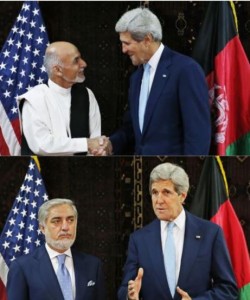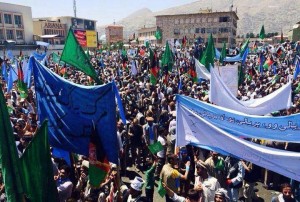With Afghan Runoff Audit Hopelessly Mired, Clock Running Out on US Hopes for BSA
I’m wishing that I had started a spreadsheet a couple of years ago to track the various deadlines the US has issued for having a signed Bilateral Security Agreement in hand. Such an agreement would authorize US troops to remain in Afghanistan with criminal immunity after the current agreement expires at the end of this year. Just a search of the tag “Bilateral Security Agreement” brings back three pages of posts on the topic at Emptywheel. Early in the process, the US position was that the mental giants in our military needed a full year to plan whether or not we were withdrawing completely, and so a signed BSA had to be in hand by the beginning of 2014. Then, after Karzai defied the loya jirga and stated that he would not sign the agreement while in office, the US pinned its hopes on the presidential elections, since the two leading candidates both stated they would sign the agreement immediately upon winning. There was the unrealistic hope that a clear winner would emerge from the first round of voting in April, but that did not come to pass. The runoff was originally slated for May 28, then moved to June 7 and finally took place June 14. But when the preliminary results of the runoff showed Abdullah moving from beating Ghani by a million votes in the first round to losing to him by a million votes in the runoff, the problems with counting votes in Afghanistan have moved to the center of the ongoing crisis.
The crisis shows no prospect of abating. Even though Kerry brokered an extra-constitutional “unity government” agreement between Abdullah and Ghani (and there has even been a nebulous conference on the new structure), the dim prospects for these two actually sharing power can be seen in how long the arguments over how to audit the runoff votes has carried on. We have had countless pronouncements out of Kabul that the snail’s pace of the audit will accelerate any day now, once the two sides agree on the procedure. The UN finally put forward its own proposal for a procedure yesterday since the candidates could not agree on one. Further disruptions in the audit will come next week as two more days will be lost to Eid. With thousands of ballot boxes still to be audited, there is no way that an official final tally will be issued by the specified August 2 date Karzai had planned for inauguration of the new president.
It’s hard to see how Kerry’s fantasy of a shared government will ever come to pass. Each candidate in the runoff will have strong grounds for declaring the results fraudulent should the other be declared the winner of the audit, and I think that is behind the impasse on developing an audit procedure. The argument can be made that there is no legitimate government in place since Karzai’s term has already expired, so there simply is no way to say who should be responsible for signing a BSA at this point. Back in December, the US openly floated the idea of working around Karzai to get someone else to sign the agreement. I’m thinking that plan is being dusted off again this week in Washington.
Kerry and the rest of the Obama administration have already shown that they are quite willing to work outside Afghanistan’s constitution when it is in their interest (as demonstrated by the shared government plan). As noted above, Karzai’s term officially expired in May. I look for the US work-around of Afghanistan’s constitution to continue and for some sort of interim government to be declared once one or both of the candidates formally abandon(s) the audit process. You can bet that government will be headed by someone who will sign the BSA immediately. But remaining in Afghanistan likely also will suddenly require a lot more US troops since it also seems likely that violence will break out between supporters of Abdullah and Ghani rather than the two sharing the new government. I doubt Obama has the courage to simply walk away from Afghanistan, but in my opinion that still remains the best option for both the US and Afghanistan. Walking away is needed because it seems clear at this point that a US presence in Afghanistan serves only to make the situation worse.


